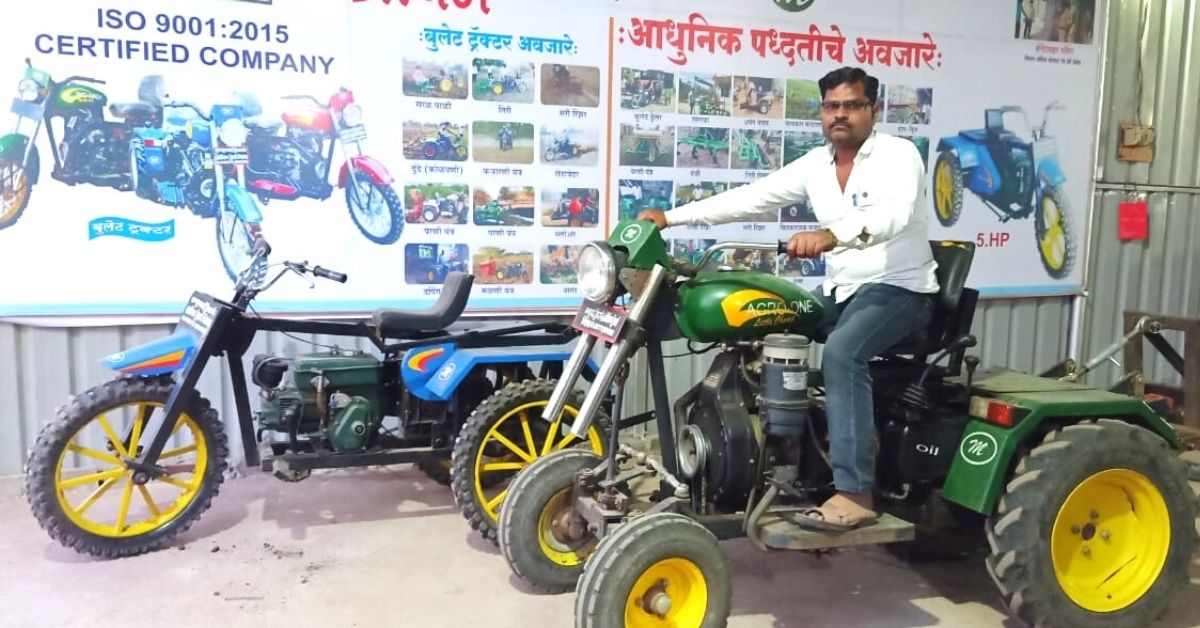Award-Winning Farmer’s Bullet Tractor Helps 140 Others Plough & Sow at 1/10 the Cost
- Get link
- X
- Other Apps

Award-Winning Farmer’s Bullet Tractor Helps 140 Others Plough & Sow at 1/10 the Cost
Maqbul Shaikh from Nilanga village in Latur, Maharashtra, has built a 10 Hp bullet tractor that can be used for sowing, weeding, spraying pesticides and ploughing, reducing the dependency on labour, and costs Rs 1.6 lakh. The vehicle is also fuel-efficient
- POST AUTHOR:HIMANSHU NITNAWARE
- POST PUBLISHED:FEBRUARY 11, 2021
- POST CATEGORY:INNOVATION MAHARASHTRA
Villagers of Nilanga in Latur, Maharashtra, have been troubled by water scarcity and poor rain since 2015. Inadequate rainfall has had a severe impact on farming and other agricultural activities. Besides the shortage of drinking water, the immediate visible effects were loss of labour and cattle. Agricultural activities took a backseat and the economy suffered. Like others in the area, Maqbul Shaikh, who has 3 acres of agricultural land, was in dire straits.
The 43-year-old farmer gave away his bullocks, owing to lack of fodder and drinking water. The loss, combined with shortage of labour, inhibited him from pursuing farming activities. But Maqbul turned this crisis into an opportunity, and built an innovative bullet tractor at 1/10th the cost of the one in the market.
The innovation has since become popular to the extent that 140 bullet tractors have been sold in and around the village. He was also recognised and awarded by the state government for this initiative.
An affordable alternative to

Maqbul says his inspiration for the innovation came from his brother’s tractor equipment workshop, named ‘Agro One Trailers and Mansurbhai Tractors’. “Since childhood, I always worked as a mechanic with my elder brother, Mansukh. I did all the repair and maintenance work. But after his death a few years ago, I took charge of the workshop, as well as farming,” he says.
He adds that he started working on a model with scrap material and engines. “The vehicle had to be small, but powerful enough to carry out heavy farming activities. Having worked as a mechanic at my brother’s workshop, I knew the technicalities involved, and decided to make a three-wheeled vehicle with a 10 Hp engine. I used a discarded bullet motorcycle for navigation and driving,” he says.
Maqbul began working on it in 2016, and it took him two years to come up with a working model. “The machine broke at least a hundred times. Many parts failed to synchronise, and making the vehicle fuel-efficient was also a challenge. It took many months of work and testing on the field before I was confident about the vehicle. I made another five and sold it to farmers in the area on a trial basis,” he says.
He worked upon the feedback to make continuous improvement. “A refined version of the product was ready in 2018, and I started offering it to potential customers. The vehicle can be made within a week, and can be used for sowing, weeding, spraying pesticides and ploughing the field,” he adds.
Maqbul says the bullet tractor comes with a range of benefits. “The normal tractor costs Rs 9 lakh at least, and with tools and equipment, the cost can increase up to Rs 14 lakh. A mini tractor costs at least Rs 3.5 lakh. But the bullet tractor is priced at Rs 1.6 lakh, or even Rs 60,000 for a smaller version,” he adds.
Multiple benefits
Several farmers have started ordering and using the vehicle, including Sudhir Kaplapure. “I have a 20-acre farm, and the bullet tractor has served all my needs without any bullocks or a powerful and expensive tractor. Unlike the big ones, this one allows the seeds to be sown in even the corners of the field. It also helps clear weeds efficiently. Attending to the sugarcane crop becomes much easier, as the tractor helps navigate narrow lanes while spraying pesticides,” he says.
Sudhir says the vehicle is also fuel-efficient. “A litre of diesel lasts for 1.5 hours in the bullet tractor. For a regular one, double the amount of fuel would be needed. Additionally, the small parts make it easier to be repaired on the fields. I have not had to hire labour in the past three years, and depend on the tractor entirely,” he adds.
Maqbul has also created a 5Hp and four-wheeled bullet tractor to sell at Rs 60,000 for those who cannot afford the 10 Hp one. His innovation has earned him the Krushi Ratna Award from the Maharashtra government, as well as the Yuva Krushi Sanshodhak Award, among others.
He says he never expected his innovation would benefit so many farmers. “I’m glad I could make a difference in their lives by making farming easier and cost-effective. I hope to continue the good work in the future as well,” he says.
Edited by Divya Sethu
We at The Better India want to showcase everything that is working in this country. By using the power of constructive journalism, we want to change India – one story at a time. If you read us, like us and want this positive news movement to grow, then do consider supporting us via the following buttons:
Comments
Post a Comment